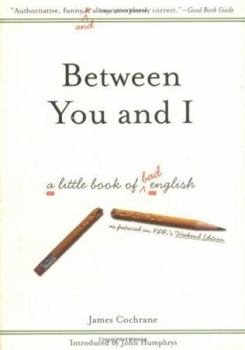Between You and I: A Little Book of Bad English
Select Format
Select Condition 
Book Overview
In the spirit of the bestselling Eats, Shoots & Leaves, this is an informative and highly amusing little book about bad English, full of examples of the incorrect grammar and usage that often pervades modern radio broadcasts, newspaper articles, classroom discussions and political speeches. As the author explains, he does not take issue with the so-called "educated or uneducated" uses of the English language. Between You and I is more concerned with...
Format:Hardcover
Language:English
ISBN:1402203314
ISBN13:9781402203312
Release Date:March 2005
Publisher:Sourcebooks
Length:160 Pages
Weight:0.50 lbs.
Dimensions:0.7" x 5.3" x 7.4"
Customer Reviews
4 ratings
between you and i
Published by Thriftbooks.com User , 19 years ago
the book was good that i would like to read it again because i told my teacher about it and she want me to do a research on it
A lively, fun read as well as a basic primer in proper usage
Published by Thriftbooks.com User , 19 years ago
Bad English isn't just about swearing and slang: it's also to be found in seemingly educated language as well as in uneducated writing: Cambridge University graduate and editor James Cochrane here assembles some of the best faux paus of the English language, providing not only an a-z dictionary of commonly misused words and phrases, but examples of how they are misused and when a better word would be more appropriate. Between You and I is a lively, fun read as well as a basic primer in proper usage.
for word geeks and wannabe word geeks
Published by Thriftbooks.com User , 19 years ago
Step aside, Lynne Truss, James Cochrane has taken center stage. Going beyond the ignorant scree of Truss, Cochrane provides clear rationales for correct word usage. One bemoans his "Losr Causes," but learns much about communication in this tiny book. The USA edition employs American spelling, which is appreciated. The only flaw is that good information gets buried, because there is no index.
English grammar but American spelling.
Published by Thriftbooks.com User , 19 years ago
There are some wonderful examples of bad English in this book which makes me write this with more than just a little trepidation. It is not a book that pokes fun at the uneducated use of English such as pointing out the use of the double negative, or ending a sentence with a preposition, but wraps the knuckles of those that should know better: those that write for a living and miss-use the English language. This book is set out like a dictionary and you can look up each of Mister Cochrane's favourite misuses of the language: if I look up free gift, for example, I am asked whether there is any other kind, a gift is all you need to write and yet we are offered free gifts every day. If you look on Google you will be offered over 100,000 offers of free gifts. James Cochrane, in his introduction, says that `invariably the examples come from people who ought to know better: broadcasters, particularly on BBC radios stations' - which may be a misprint in my copy or maybe that is the way it is supposed to be; but I will presume it to be a misprint or typo - as I type this I once again refer to the book to see if typo is acceptable; it's not in there so it must be - so getting back to the BBC: there is an excellent 'Forward' to this wonderful book written by John Humphrys of the ostensibly mis-aligned BBC. It is a very well written little piece from a man who is only known in Britain, where he is greatly respected - not prestigious you understand as that's a bad word and comes from prestidigitation which has something to do with conjuring tricks with hands - his 'Forward' is a delight but I have to wonder what use John Humphrys is to the American version of the book here in the USA? Maybe someone like Geoffrey Nunberg of NPR's `Fresh Air' might have been a better candidate to write the 'Forward'; he has written similar books: `the way we talk now' and `Going Nucular' spring to mind. But I further wonder and ask myself whether such a book should be translated in the first place. Would it serve any purpose being translated into French for example? The answer is no; so why has it been translated into American - for that is another language? Winston Churchill said it was the common language which separated the two countries but when you have lived in Britain for about 45 years and then come to live in America you soon realise that it's a different language. Forget about popping a hood, buying a Winnebago or having your bangs trimmed most Americans don't understand anybody from Britain even when they slow down and learn those phrases. They just don't understand the untranslateble phrase taking the piss; it cannot be explained to them and when we try they don't believe it. I have noticed that `one off' has started to creep into the language over here so maybe things are looking up - depending on which way you look at it. I really enjoy this book - enjoy I say as I look at it all the time and keep it on my coffee table to refer to now and again but I have to





